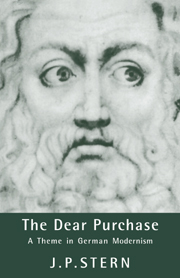8 - Postscript: the divided self
Published online by Cambridge University Press: 04 December 2009
Summary
In Ulrich, the hero of Robert Musil's The Man without Qualities, we have seen a man seeking an alternative to, and a redemption from, a charmed and yet meaningless life; the qualities he proposes to dispense with are those of which Meister Eckhart speaks as characteristic of that unredeemed self to which men and women cling – qualities which stand as obstacles on their way to God. ‘The Other [or the Mystic] Condition’ is the name Ulrich gives to the redemption he is seeking from irredeemable triviality.
Ulrich's quest has its counterpart in Musil's stylistic task of embodying the disembodied – the attempt, on a much larger scale, to solve the same problem that faced Thomas Mann in the Schopenhauer chapter of Buddenbrooks. In fact, Musil's novel fulfils our expectations of a coherent realistic narrative only so long as it concerns the social and erotic muddles in the shadow of the ‘parallel action’. Whenever it abandons this ‘action’ and moves to that mystic level of narrative-and-discourse called ‘the Other Condition’, it plunges into fragmentariness. Realism, after all, goes with a world teetering on the verge of meaninglessness, or at least pointlessness; there can be no single concrete world in which the Great Meaning could be revealed as co-existing with what is presented realistically. The fragmented self portrayed by Musil is thus divided between Public Relations as the world of ‘other people’, of the ‘collective One’, and the intent search for mystical wholeness through love.
There may be other ways of attaining that wholeness.
- Type
- Chapter
- Information
- The Dear PurchaseA Theme in German Modernism, pp. 410 - 417Publisher: Cambridge University PressPrint publication year: 1995

